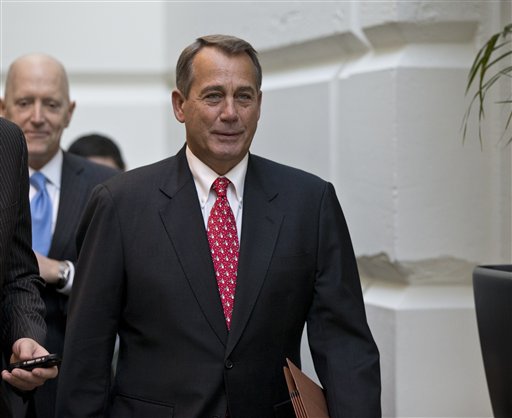WASHINGTON – More than 7,000 Maine residents could be among the first Americans to fall off the “fiscal cliff” unless Democrats and Republicans on Capitol Hill agree to extend unemployment benefits for 2 million Americans who have been out of work for six months or longer.
Congress has voted repeatedly since the recession began to lengthen the eligibility period for federal unemployment benefits, in recognition that many laid-off workers struggle for months or even years to find new jobs.
The latest extension ends this month, shortening the eligibility from a maximum of 73 weeks to 26 weeks.
The question of whether to grant another year-long extension – at a cost of $25 billion to $30 billion – is tied up in slow-moving negotiations over the combination of tax increases and spending cuts known as the fiscal cliff. While the White House and Democratic leaders support an extension, some are concerned that the unemployment benefits could be taken off the table as part of a larger deal.
“This is the real cliff,” Sen. Jack Reed, D-R.I., said Tuesday. “At the end of the year, two million people will literally be in financial free-fall unless we step up.”
Estimates vary, but 6,400 to 7,100 Mainers will likely lose their benefits if Congress does not grant another extension. The Maine Department of Labor, which distributes the unemployment payments, began warning recipients about the potential cut-off back in September.
“We are trying to soften the blow,” said Julie Rabinowitz, spokeswoman for the Department of Labor. “It is a difficult situation and something we have been working on with our career centers for several months.”
Officially, the LePage administration has not taken a position on the issue. “This is really something that Washington has to address,” Rabinowitz said.
Unemployment benefits have received scant attention from either party on Capitol Hill amid the broader discussions over tax rates, spending cuts and the federal deficit.
The White House included an extension in its latest offer to avert the fiscal cliff, but House Speaker John Boehner and other Republican leaders have been largely silent on the issue as they have focused on the bigger items.
On Tuesday, Reed and other House Democrats held a press conference to try to “put a face on the numbers.”
Dan Haney of Philadelphia lost his job along with 650 others when their positions were outsourced. Haney said he spends hours every day searching for jobs and has held some temporary positions, but the unemployment benefits have been critical.
“It’s hard to imagine that Congress would willfully allow such a heartless outcome for so many of their fellow citizens who, like me, just need some more time to find new jobs as our economy is turning around,” Haney said.
All four members of Maine’s congressional delegation have voted for past extensions, and most signaled they would consider doing so again.
Reps. Mike Michaud and Chellie Pingree, both Democrats, were among several dozen who signed onto a letter telling congressional leaders “now is not the time to roll back this critical lifeline.”
“Reducing federal unemployment benefits would plunge hundreds of thousands of Americans into poverty and jeopardize our nation’s economic recovery,” the letter reads.
A spokesman for Republican Sen. Susan Collins of Maine said she would want to see the actual proposal but noted that she supported the last extension.
Past extensions have passed with strong bipartisan support. But the estimated $30 billion cost of a one-year extension is likely to trigger opposition from budget hawks. Some Republicans have said that any extension would have to be paid for with budget reductions elsewhere, an insistence that would complicate passage.
Among those who will be watching closely is John Degon of Portland, who began searching for work in February when it was clear that his position would be cut. Degon said he has applied for about 50 jobs — both professional and non-professional — and done all of the recommended networking, without success.
He has a background as a librarian and is looking to combine his teaching and training skills in a corporate setting.
While a few temporary jobs and seasonal work have helped, he estimates that his benefits will run out in March if Congress does not act. Although he has a roof over his head thanks to his partner, Degon is fearful about how he would repay his student loans and contribute to paying bills without unemployment benefits. “If I run out and have zero income, I’m really scared,” he said.
A recent report by the Congressional Budget Office said unemployment benefits actually help to create jobs because almost every dollar immediately flows back into the economy.
James Sherk with the conservative Heritage Foundation disagreed, writing recently that the organization’s own analysis found that the checks don’t always spawn “new consumption” and may, in fact, delay re-employment.
But, Sherk wrote, that doesn’t mean the benefits should revert back to 26 weeks.
“(Unemployment insurance) benefits provide important assistance to those struggling to find jobs,” he wrote in a recent blog. “Rather, Congress should make policy tradeoffs between the humanitarian benefits of (unemployment) spending and the economic costs they entail.”
Washington Bureau Chief Kevin Miller can be contacted at 317-6256 or at:
kmiller@mainetoday.com
On Twitter: @KevinMillerDC
Send questions/comments to the editors.



